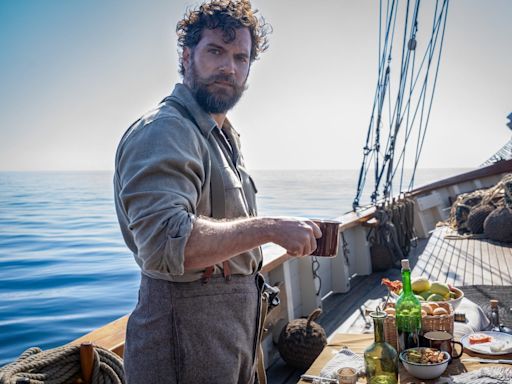Search results
Nov 28, 2014 · T hough The Imitation Game was largely based on the biography Alan Turing: The Enigma, much of Alan Turing’s life is shrouded in mystery.Turing, played by Benedict Cumberbatch in the film, is ...
- Eliana Dockterman
- Is Detective Robert Nock Based on A Real person?
- Was Alan Turing Really Put on Trial For Being Gay?
- Did Alan's Friend Christopher Really Die Suddenly of Bovine Tuberculosis?
- Did Turing Come Up with The Design For The Codebreaking Machine on His own?
- Did Alan Turing's Codebreaking Machine Look Like The One in The Movie?
- Did The Soviet Spy, John Cairncross, Really Work with Alan Turing?
- Did Turing's Team only Pass Along A Percentage of The Decoded messages?
- Did Joan Clarke Visit Alan Turing After The War?
- Is There A Reason Why We Don't See Alan Turing's Suicide in The Film?
- Was The Imitation Game Movie Filmed at The Real Bletchley Park?
No. "Detective Nock is a fake name - he was named after my old roommate," says screenwriter Graham Moore. "He gives us another perspective ... we can see how a normal person, not a bad person, could end up doing this horrible thing to Alan. We didn't want to create this story of Alan being a sad character that bad things happened to, so we decided ...
Yes. The Imitation Game true story confirms that on March 31, 1952, British authorities put Alan Turing on trial for indecency because he had homosexual relations with a 19-year-old man named Arnold Murray, twenty years his junior. Homosexuality was a crime in Great Britain in the early 1950s, falling under gross indecency in Section 11 of the Crim...
Yes. The real Alan Turing met Christopher Morcom at Sherborne School, the boys' school in Dorset, England, which Alan attended as a teenager. The two became good friends, sharing an interest in math and chemistry (not codes and ciphers). Morcom, who was a year older, did die suddenly of bovine tuberculosis, which he had contracted as a small boy fr...
No. Unlike the movie, Alan Turing didn't come up with the design for the improved Bombe machine on his own. Gordon Welchman, a mathematician who is not mentioned in the film, collaborated with Turing. -Alan Turing: The Enigma
For the most part, yes. However, the real codebreaking machine, the Bombe, was housed in a Bakelite box. Production designer Maria Djurkovic and her team researched the working replica that is on display at Bletchley Park in Buckinghamshire, England. "Our version of the machine had to look convincing," says Djurkovic. She and director Morten Tyldum...
No. Our research into The Imitation Game true story exposed the fact that although John Cairncross did work at Bletchley Park and admitted to being a Soviet spy in 1951, he did not work as part of Alan Turing's group. "Their relationship is invented," says author Andrew Hodges. It is unlikely that they ever even had contact with one another, since ...
Yes, but the movie's account of how the group decided which decoded messages to pass along to British forces is fictional. In the film, Turing (Benedict Cumberbatch) and his team crack Enigma but hold off on telling their superiors for fear that the Germans will become suspicious and change the code. After they decide against passing along intercep...
No. Andrew Hodges' biography states that Alan wrote to Joan and told her that he had been found out, but there is no mention of Joan coming to visit Alan. At the time of his letter, Joan was engaged to be married, as Keira Knightley's character is when she visits Alan (Benedict Cumberbatch) in the movie.
On June 7, 1954, roughly a year after he underwent "chemical castration" (estrogen injections) as a way of avoiding prison time for his indecency conviction, Alan Turning ingested an apple that he had likely laced with cyanide (it is speculated that the half-eaten apple was the delivery method, though it was never tested). Biographer Andrew Hodges ...
The only scenes that were actually shot at the real Bletchley Park (located in Milton Keynes, Buckinghamshire, England) took place at the bar. This includes Turing's eureka moment, the engagement party scene, and his confession to John Cairncross about being gay. Other parts of the movie were filmed at Alan Turing's childhood school, where his pict...
The Imitation Game is a 2014 American period biographical thriller film directed by Morten Tyldum and written by Graham Moore, based on the 1983 biography Alan Turing: The Enigma by Andrew Hodges. The film's title quotes the name of the game cryptanalyst Alan Turing proposed for answering the question "Can machines think?", in his 1950 seminal ...
- $233.6 million
- Alexandre Desplat
- $14 million
People also ask
Is the Imitation Game based on a true story?
Is 'the Imitation Game' a Boys Own Story?
What is a 'Imitation Game'?
When did 'The Imitation Game' come out?
2 days ago · Exploring The Imitation Game: True Story Insights. The Imitation Game, released in 2014, captures the gripping narrative of Alan Turing, the brilliant mathematician who played a pivotal role in cracking the Enigma code during World War II. This film not only explores the intellectual challenges faced by Turing and his team but also delves into ...
Jan 8, 2015 · The acclaimed new movie The Imitation Game is based on the too-short life of Alan Turing, the British mathematician and “father” of computer science. But how true-to-life is it and what can we ...
Jan 27, 2024 · The Imitation Game 's true story reveals the key role British mathematician and computer pioneer Alan Turing (Benedict Cumberbatch) played in breaking Germany's Enigma machine during World War II. With the Axis threat looming large on the Allies, the movie explores Turing's contributions to intercepting and cracking codes that helped win the war.

